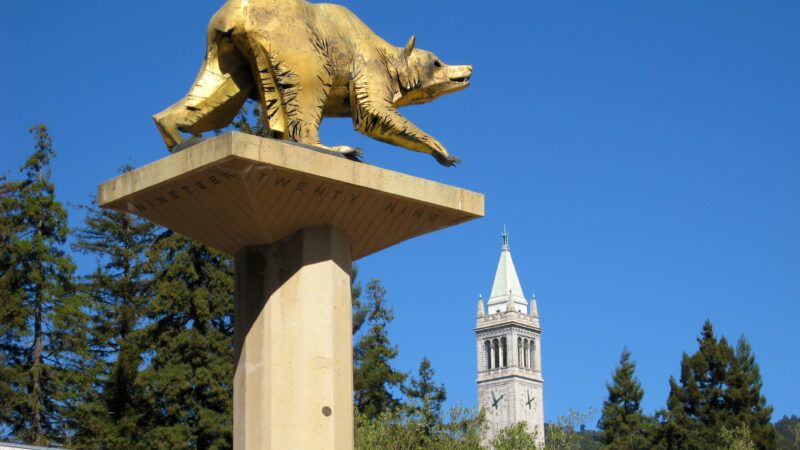By Forcing U.C. Berkeley To Cut Enrollment, Have California's NIMBYs Finally Gone Too Far?
Lawmakers are proposing to strip neighborhood activists of the legal tools they've used to freeze the university's student population.

"Not in my backyard" (NIMBY) activists in Berkeley, California, might end up winning the battle but losing the war in their legal crusade to stop the growth of the student population at the University of California, Berkeley, campus.
Activists' success in a court-ordered enrollment freeze at the university—which would result in thousands of otherwise accepted Berkeley students receiving rejection letters—is prompting a backlash from both Gov. Gavin Newsom and state lawmakers that could undo their efforts to deprive incoming freshmen of a Berkeley education.
The governor is asking the California Supreme Court to side with the university and stay the impending enrollment freeze. Legislators are going further with a proposed bill to deprive litigious neighbors of their ability to stop people from going to a school that is eager to accept them.
"It is unacceptable for NIMBY lawsuits to strip students of their right to a quality education by blocking housing and effectively forcing schools to reduce enrollment," said state Sen. Scott Wiener (D–San Francisco) in a press release Tuesday announcing the introduction of Senate Bill (S.B.) 886.
The bill would exempt public universities' staff, students, and faculty housing projects from having to go through the onerous environmental review required by the California Environmental Quality Act (CEQA).
Those reviews can take years to complete and cost millions of dollars. CEQA also allows citizens and third parties to sue if they think an environmental review wasn't thorough enough, making it a favored tool of anti-development activists looking to gum up projects they don't like.
That includes the group Save Berkeley's Neighborhoods. In 2019, it sued U.C. Berkeley and the U.C. Board of Regents (the U.C. system's governing body) arguing that an environmental study of a new on-campus faculty housing project didn't adequately examine the impacts of a growing student population on things like traffic and noise, as required by CEQA.
In August 2020, a lower court judge agreed with Save Berkeley's Neighborhoods and ordered U.C. Berkeley to freeze enrollment at 2020–2021 levels until a new study on the impacts of more young scholars on campus could be done.
In January, the university asked a California appeals court to stay the enrollment freeze while its appeal of the lower court ruling worked its way through the courts. That request was rejected earlier this month, leading the university to ask the state Supreme Court to intervene to stay the enrollment freeze.
Letting the cap stand, it argued, would have a "devastating impact" on prospective and current students.
In order to cut enrollment down to 2020 levels, the university says it would have to send out 5,100 fewer admission letters. It would also lose $57 million in tuition by accepting fewer students, which the university says would impact its ability to offer financial aid and fund existing programs.
Phil Bokovoy, president of Save Berkeley's Neighborhoods, says that the university has no one but itself to blame for its court losses. He says the university is constantly expanding enrollment without establishing plans for housing the new students it's bringing to town.
The university was trying to escape responsibility for "the severe impacts that unmitigated enrollment growth has had on low-income tenants in the city of Berkeley," said Bokovoy in a press release. He also said that the university could easily hit its enrollment cap by accepting fewer out-of-state and international students.
That argument hasn't sat well with Newsom. Last Friday, his administration filed an amicus brief in support of U.C. Berkeley's request to stay the enrollment cap.
"We can't let a lawsuit get in the way of the education and dreams of thousands of students who are our future leaders and innovators," said the governor in a statement announcing the amicus brief. "I urge the Supreme Court to step in to ensure we are expanding access to higher education and opportunity, not blocking it."
The amicus brief, submitted by state Attorney General Rob Bonta, explicitly states that it isn't weighing in on whether the U.C. Board of Regents is compliant with CEQA. Rather, it's focused solely on "the benefits and burdens" of the board's requested stay of the enrollment cap.
Nevertheless, the one-two punch of Newsom's amicus brief and Wiener's university housing bill is more evidence of a sea change in California housing politics.
State officials are increasingly working in tandem to combat the often cynical (and sometimes silly) efforts of local NIMBYs to stop or stall new development. The NIMBY backlash to these interventions is increasingly falling flat.
Last year, for instance, the state legislature passed a number of pro-development housing reforms, including a bill (co-authored by Wiener) that legalized duplexes on single-family zoned land statewide.
When the small Silicon Valley community of Woodside attempted to skirt this duplex legalization by declaring the entire town as a protected mountain lion habitat off limits to duplexes, Bonta sent the town a letter arguing the move was illegal. The Woodside government quickly folded.
Local control activists pushing a ballot measure that would nullify that duplex legalization—and prevent the state from passing future zoning reforms—are now trying to get their initiative on the 2024 ballot. Their initial goal was to have their measure before voters later this year.
State officials are also beefing up their enforcement of state laws that put limits on local officials' discretion to deny housing projects or delay them with endless CEQA reviews. That task used to largely fall to a few small "yes in my backyard" (YIMBY) organizations.
To be sure, California's laws are still quite favorable to the opponents of new development. The U.C. Berkeley episode suggests the state's patience with these NIMBY escapades is wearing thin.
